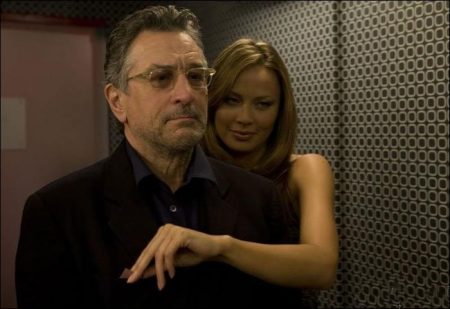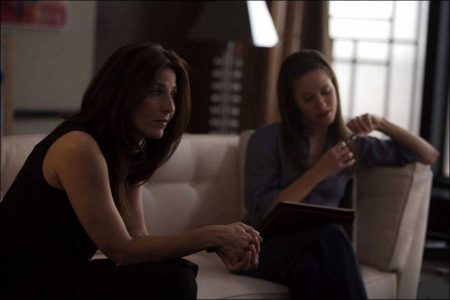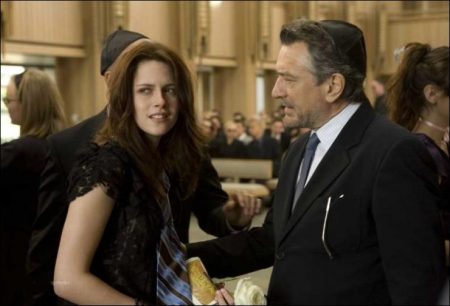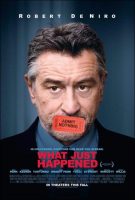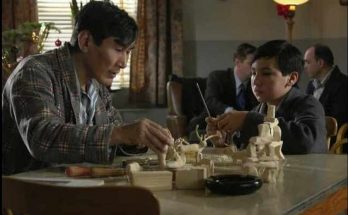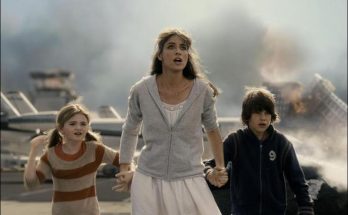Tagline: Admit nothing..
What Just Happened? movie storyline. During the course of an ordinary week in Hollywood, movie producer Ben (Robert De Niro) must navigate his way through shark-infested waters as he struggles to complete his latest projects. A demanding studio boss (Catherine Keener) demands extensive changes to a movie starring Sean Penn, while another chief won’t greenlight a project unless star Bruce Willis shaves his beard. Meanwhile, Ben tries to reconcile with his wife and maintain a relationship with his young daughter.
What Just Happened is a winningly sharp comedy about two nail-biting, back-stabbing, roller-coaster weeks in the world of a middle-aged Hollywood producer — as he tries to juggle an actual life with an outrageous series of crises in his day job.
Academy Award winning director Barry Levinson reunites with Robert De Niro and leading producer Art Linson, who wrote the screenplay based on his bestselling memoir. They all join with an all-star cast in this rollicking, shrewd tale of a man besieged by people who want him to be all sorts of things — a money maker, an ego buster, a bad news breaker, an artistic champion, a loyal husband, an all-knowing father, not to mention sexy, youthful and tuned-in – everything except for the one thing he and all the preposterously behaved people he’s surrounded by really are: bumbling human beings just trying to survive by any means necessary.
Ben (Robert De Niro) is already in over his head trying to balance the tug-of-war of having two ex-wives and two different families with his latest business venture – the boldly “visionary” movie Fiercely starring Sean Penn (Sean Penn) – when everything that can go wrong goes completely screwy. Fiercely looks like an audience-offending flop which draws the ire of iron-gloved studio chief Lou (Catherine Keener), who forces him into tangling with the film’s rebellious and drug-addled director Jeremy (Michael Wincott).
Meanwhile, he’s confused and bewitched by his ex Kelly (Robin Wright Penn) who can’t make up her mind about him; shocked by his daughter Zoe (Kristen Stewart), who seems to have grown up overnight; infuriated by his screenwriter friend Scott (Stanley Tucci) who’s trying to make a deal with him while making moves on his former wife; horrified by a hirsute Bruce Willis (Bruce Willis) and flummoxed by Willis’ nebbishy agent Dick (John Turturro), who’s scared to death of his own clients. Somehow amidst all the madness, treachery, deceit, runaway egos, rampant commercialism, personal politics and atrocious behavior of America’s dream-making machinery, Ben has to find a way not just to make it to Cannes with a finished film, but to cope…
What Just Happened is based on the acclaimed, bestselling memoir by veteran Hollywood producer Art Linson, who wrote the screenplay and produced the film with Robert De Niro and Jane Rosenthal. The executive producers are Todd Wagner and Mark Cuban.
The behind-the-scenes team includes cinematographer Stéphane Fontaine (Talk To Me, The Beat My Heart Skipped), editor Hank Corwin (The New World), production designer Stefania Cella (Man of the Year) and composer Marcelo Zarvos (The Good Shepherd). The film is set to a soundtrack that mixes the classic cinematic sounds of Ennio Morricone with the songs of Nick Drake, Citizen Cope, Dire Straits, Bebel Gilberto and Nina Simone, among others.
About the Film
“Let’s face it, time was running out. In fact, the sand in the hourglass was hemorrhaging. For me, producing movies had become an increasingly farfetched affair. And in this town where “new” is best, I could feel that black hole of Hollywood purgatory waiting for me.” — Art Linson, What Just Happened: Bitter Hollywood Tales From the Front Line
Part outrageous comedy, part compelling portrait of a man trapped in a middle-aged muddle of his own making and part uncensored exposé of Hollywood’s high rollers and deal makers, What Just Happened began with real life – the real life of the film’s producer Art Linson. Linson has produced some of the most memorable films in recent Hollywood history — ranging from The Untouchables and Fast Times at Ridgemont High to Fight Club and last year’s acclaimed Into The Wild. Then in 2002, he published a bestselling memoir, What Just Happened: Bitter Hollywood Tales From the Front Line – a vividly honest, razor-sharp and often hilarious retelling of some of the power plays, worst ego trips and excruciating moments he experienced in the back rooms of the movie business.
A few years later, Linson adapted the memoir into a completely fictionalized screenplay featuring a lead character who was, on the one hand, a prototypical product of today’s Hollywood, and on the other, not all that different from a lot of Americans – a man desperately trying to juggle his fractured family with his crazy career without creating a total disaster. While firmly in the tradition of stories that have peeked into the power-and-paranoia-fueled inner sanctum of Hollywood, ranging from The Bad and The Beautiful to The Player to HBO’s popular Entourage, Linson’s screenplay was also a contemporary comedy of manners – appallingly bad manners, that is.
The wry but enticing tone of the script drew the attention of two men who had previously teamed with Linson: Robert De Niro whose distinguished body of work includes winning two Oscars® for his unforgettable performances in The Godfather Part II and Raging Bull, as well as four additional nominations for Taxi Driver, The Deer Hunter, Awakenings and Cape Fear; and director Barry Levinson, who won the Best Director Oscar for Rain Man, received a nomination and numerous other awards for Bugsy and garnered three nominations as a screenwriter for And Justice for All, Diner and Avalon. De Niro and Levinson last worked together on the acclaimed political satire Wag the Dog, and De Niro suspected that What Just Happened would appeal to the director’s sensibilities, which have always veered towards sly, humor-filled explorations of human behavior.
“Bob had always encouraged Art to write a screenplay based on his memoirs, and then when Art did, Bob encouraged him to send it to me,” recalls Levinson. “I responded to it because I thought it was very funny but also very real. You read a lot of stories about Hollywood that are just straight-ahead spoofs, but as outrageous as this story was, it also reflected very much what the business is actually like. It felt very credible and honest.”
Levinson was especially drawn to the sharply etched character of Ben, who finds himself traversing a kind of Dante’s Inferno of raging egos, unbridled humiliation and familial confusion in just 14 manic days – and both the comedy and the humanity of how he tries to find his way to the other side any which way he can.
“I’m always fascinated by people under extreme pressure and I liked that this story is, at heart, about a man just trying to survive two weeks in hell,” says Levinson. “What really makes Ben so interesting to me, though, is that he’s not just the witness to all this – he’s at least as flawed as everyone around him. He’s no better and no worse than all the people driving him crazy and I didn’t want to make any apologies for his behavior. He is what he is and what we set out to capture is how Ben is just literally intent on finding ways to keep going no matter what happens.”
And yet, as much as Ben might be caught up in Hollywood’s machinations of power, wealth and fame, Levinson also saw him as a very relatable, not to mention achingly human, character of our times. “You hope that by creating a character with such great specificity that it will have universal appeal,” he explains. “And I think Ben is someone who is trying to do things that a lot of people are trying to do: hold his family together while navigating a battlefield.”
He continues: “The nature of film has always been to take audiences into another place, perhaps a place where you might see issues that reflect your own, but it’s still another place outside your reality. There’s a long-standing cinematic sub-genre of looking at Hollywood that way, from Singing in the Rain to Sunset Boulevvard, which have long fascinated audiences. Sure, Ben might be among the rich and famous, but he struggles as much as anyone else, which is what makes him so interesting.”
From the beginning, Levinson also knew that the comedy and the complexity of Ben would be brought to life by Robert De Niro, who not only knew Art Linson very well but had his own wickedly astute take on the character: as a man with a deliciously dark streak of tragedy running through his world of absurdities. “Bob absorbed all the things about Art that he felt might apply – the style of dress, the slight beard, those sorts of visual cues – and then he defined the character himself,” says Levinson.
Adds Linson of De Niro’s performance: “Bob instinctively knew that a man hanging over a ledge in Hollywood is desperately funny and true. He ferociously inhaled that idea and the rest of us followed.”
With Linson, De Niro and Levinson all on board, What Just Happened was able to attract a star-studded cast that includes many surprises: Sean Penn playing himself as the self-satisfied star of Ben’s artsy movie Fiercely; Bruce Willis in a bold turn as a bearded, blown-up, brazenly arrogant version of himself as the star who could sink or save Ben’s next movie with a razor; Catherine Keener as the quietly bullying studio exec determined to cut her losses; John Turturro as an agent lacking intestinal fortitude in more ways than one; Michael Wincott, sporting a British accent and rock star attitude, as the supposedly visionary director whose violent film goes way beyond the pale; Robin Wright Penn as the indecisive ex-wife with whom Ben is trying in vain to get back together; Kristen Stewart as the 17 year-old daughter whose own Hollywood connections go much deeper than Ben would like to know; and Stanley Tucci as the argyle sock-wearing screenwriter who nearly drives him mad with jealousy.
Levinson says he worked largely intuitively with this highly accomplished ensemble of actors to allow so many comic moments – from Michael Wincott on a pill-popping binge to John Turturro dry heaving all over town to Bruce Willis throwing the mother of all tantrums — to unfold organically. “There’s just a little bit of sleight of hand involved, what I call a ‘controlled freedom,’ which ensures that no one feels inhibited to try to experiment; yet, at the same there is a strong respect for the structure and characters of the screenplay,” says Levinson.
The performances were so strong that, in several cases, Levinson was inspired to keep the camera rolling in unusually long single takes. This was particularly true for the scene in which Robert De Niro and Robin Wright Penn as Ben and Kelly visit the psychiatrist whose primary goal is to keep the couple happily apart ever after. “Their performance together was so strong that it didn’t need any coverage. It worked as a single shot,” says Levinson.
Similarly, when Ben races back to his office trying to find Bruce Willis while simultaneously taking dueling form his irate ex-wife and his off-the-rails director Jeremy – a scene that goes down the hallway, through the office, and back down the hallway — the camera stays with him and his frenzied turmoil the whole way. Explains Levinson: “Bob was so on his game and his motor was so tuned to the movie that he drove the whole sequence without any need to build or cut.”
* * *
What Just Happened was shot indie-style in just 33 days, a schedule, which although challenging, only helped to add to the film’s rapid-fire energy and liveliness. To forge the film’s freeway-paced, sun-drenched, L.A.-style look on a shoestring, Barry Levinson brought in a cinematographer with whom he’s never collaborated before: Stéphane Fontaine, whose intense, mood-setting work on the award-winning French crime drama The Beat My Heart Skipped had impressed him.
For What Just Happened Levinson wanted a similarly immediate and lo-fi approach. “I wanted a look that didn’t feel too manicured, that was very direct and organic, and not studied,” explains Levinson. “Stéphane is not only highly adept in terms of working with light, he also serves as his own camera operator and is very, very good at moving with the actors.”
The visuals of the film turn more playful – imbued with a fast-forwarding sensation – in the many freeway sequences where Ben remains ever attached to his Bluetooth phone, lost in time yet unable to escape the constant motion of the city. For Levinson, these scenes help to set the ineffable tone of life in Los Angeles. “In Los Angeles, whether you’re a producer or anybody else, so much of your life is spent in the car that it becomes an important place,” he notes. “The scenes on the freeway are about the non-stop adrenaline and hypertension of Ben’s life, the idea that he can never really just stop and settle down.”
The frenzy of Ben’s life, however, never spilled over into the focused atmosphere of the production. The shoot certainly offered plenty of potential landmines – especially since it was comically portraying characters in the very same positions as the people making the movie. But Barry Levinson says, in the end, this sharp-edged excavation of his own world went down surprisingly smooth and easy, with blessedly little in the way of the characters’ unabashedly overheated behavior showing up on the set.
He sums up: “We were lucky because everyone involved got very much into the spirit of what we were trying to go and they really went with it and actually… it was a very, very pleasant experience.”
What Just Happened? (2008)
Directed by: Barry Levinson
Starring: Robert De Niro, Sean Penn, Bruce Willis, Catherine Keener, John Turturro, Robin Wright Penn, Kristen Stewart, Lily Rabe, Michael Wincott, Jason Kravits, Sam Levinson
Screenplay by: Art Linson
Production Design by: Stefania Cella
Cinematography by: Stéphane Fontaine
Film Editing by: Hank Corwin
Costume Design by: Ann Roth
Set Decoration by: Roya Parivar
Art Direction by: Anthony D. Parrillo
Music by: Marcelo Zarvos
MPAA Rating: R for Language, some violent images, sexual content, drug material.
Distributed by: Magnolia Pictures
Release Date: October 3, 2008
Views: 177
